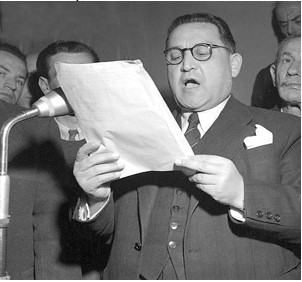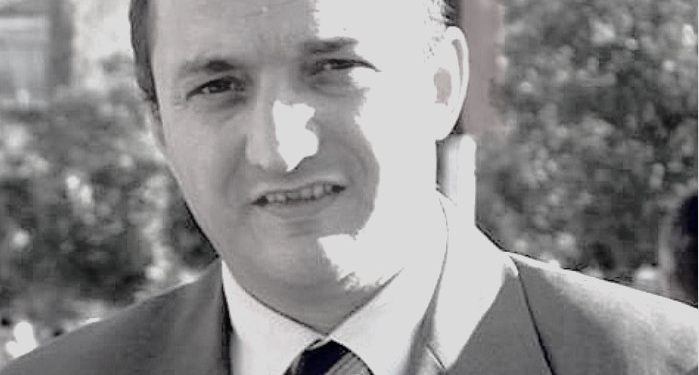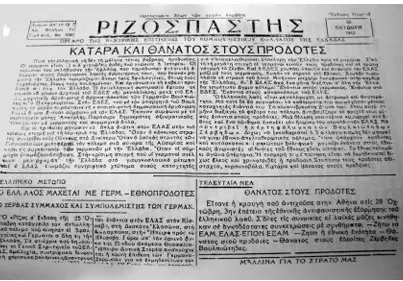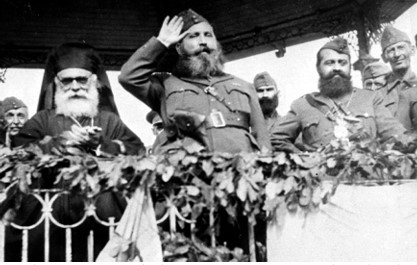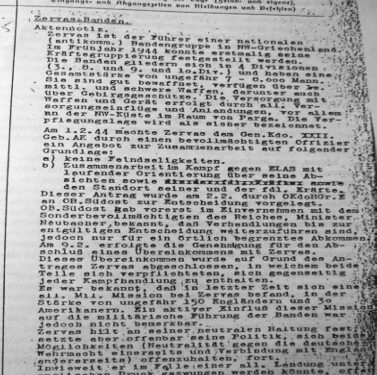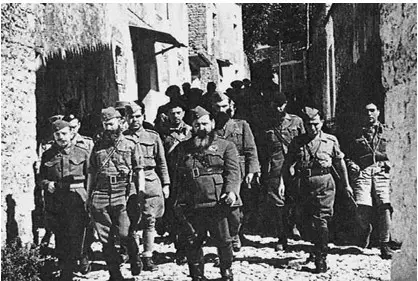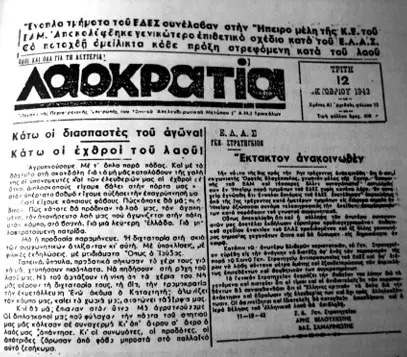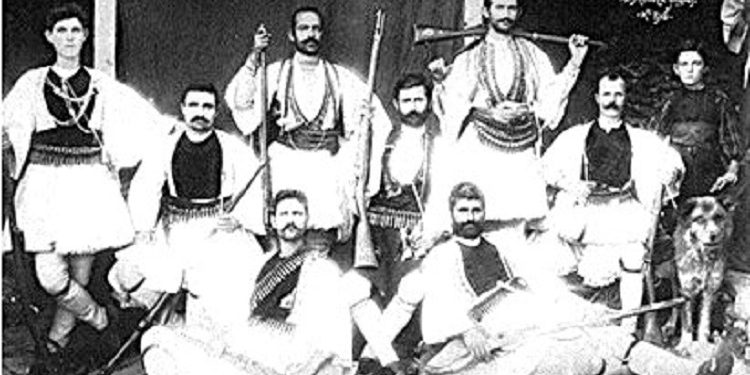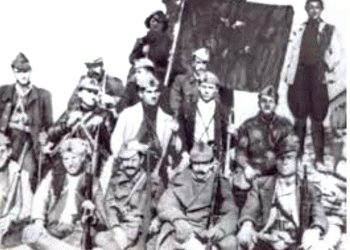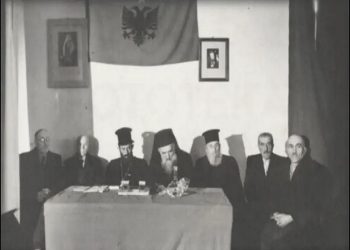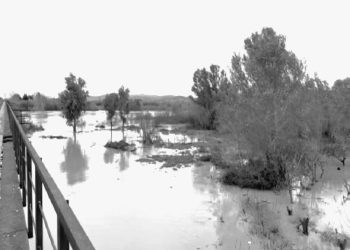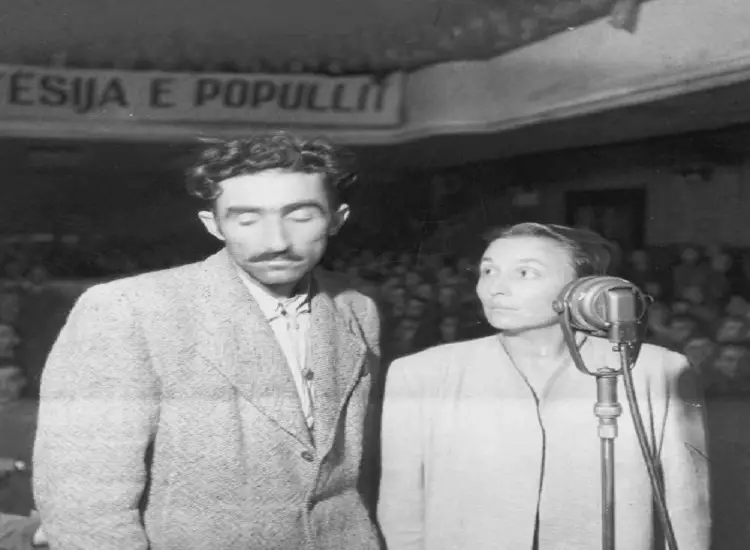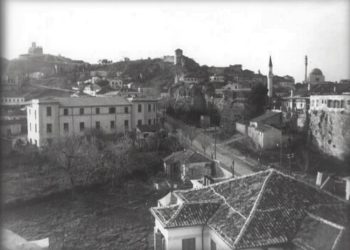From Arben P. Llalla
Part Five
-The Greek collaborators, designers and leaders of the genocide in Chameria (1944-1945) The truth of the Chams’ collaboration with the Germans –
PREFACE
Memorie.al / The period I started writing the book was from 2008-2016, collecting the materials little by little. I found it very difficult to find original photographs and some Greek newspapers for the years in question. The Greek state and its state structures have been feeding internal and external opinion for about 70 years with books and writings of lies about what really happened from 1936-1945, in relation to the Albanian minority in Chameria-Southern Epirus.
Continues from the previous issue
The collaboration of the Vlachs with the Nazi-Fascists
(Proclamation of the Autonomy of the Principality of Pindus)
Giorgio MITSIBUNA, born in Samarina. He was a member of the “Roman Legions” in Grevena. He collaborated with the Italians and Germans. He took part in several battles against the ELAS resistance army. In 1944 he left for Romania where he was sentenced to 20 years in prison.
Stefano KOÇOS, was a member of the Vlach Autonomy movement and the main leader of the “Roman Legions” in Elassona. In 1943, he became Prefect of Larissa, was a collaborator of the Italians and Germans. After the war he was sentenced to life imprisonment.
Nikolaos FRANGO, was born in Elassona and was a signatory of the Manifesto and leader of the “Roman Legions” in Elassona. He collaborated with the Italians; after the war he was sentenced to 15 years in prison.
Ziko AREA, born in Grevena and lived in Samarina. He was anti-Greek and a fanatic of Vlach autonomy since 1917. He was a professor, director of the Romanian high school in Grevena and chairman of the Romanians of Grevena. In March 1941 he signed the Manifesto as a representative of the Vlachs of Bulgaria. After the capitulation of Italy in 1943 he settled in Thessaloniki. After the war he was sentenced to 15 years in prison.
Sotiri Ziko AREA was a professor at the Romanian high school in Grevena. He was a supporter of the Autonomy of the Vlachs, a collaborator of the Italians and anti-Greek. After the war he was sentenced to 3 years in prison.
Giorgios VASILAQI, was born in Grevena, a lawyer by profession, was anti-Greek and pro-Vlach Autonomy movement since 1917. In 1916 he had been mayor of Grevena. In March 1941, he signed the ‘Vlach Manifesto’ and collaborated with the Italians. After the war he was sentenced to 3 years in prison.
Giorgio KAZANAS was a lawyer in Grevena and a cousin of Alqiviadhis Diamandi. He collaborated with the Italians and made pro-Romanian propaganda. He led the office of the Romanian Community in Grevena. After the war he was sentenced to life imprisonment.
Periklis Dhimitër PITELI, businessman, first cousin of Diamandi and his trusted person. He supported the Autonomy and the Manifesto of the Vlachs of Pindus. After the war he was sentenced to 15 years in prison.
Joani Nikolaos MERCOS was born in Nimfeo of Follorina. He was a signatory of the Manifesto of Autonomy of the Principality of Pindus. After collaborating with the Italians in Larissa in 1942, he moved to Thessaloniki with his family and began collaborating with the Germans. After the war he was sentenced to 11 years in prison. His son, Nikolaos Joani Mercos, born in 1936, in Nimfeo of Follorina, is a lawyer and writer.
In 1990-1993, he was an adviser to Prime Minister Konstantinos Mitsotakis, on national issues of Greece. Merco has worked closely with the former president and former prime minister of Greece, Konstantinos Karamanlis. Nikolaos Mercos is an honored figure of the Greek state and is a friend of the Archbishop of the1 Autocephalous Church of Albania, Anastasios.
Vasileos AGOROJANIS, from Samarina, was the head of the Autonomous Vlach movement in Samarina.
Stergios Kristo ANAGNOSTI was a supporter of Vlach Autonomy. He collaborated with the Italians and Germans. After the war he was sentenced to life imprisonment.
Vasileos VARDHURLI, from Dhistrato, a signatory of the Vlach Autonomy Manifesto.
Nikolaos Efthimio GALANI, from Dhistrato, during the Italo-Greek war abandoned the uniform of the Greek army and wore the Italian one. He was a supporter of the Vlach Autonomy. He was sentenced to death in absentia.
Giorgio GJULEKA was from Samarina and lived in Elassona. He was a signatory of the Vlach Autonomy Manifesto and a member of the Roman Legions. He is listed as missing. Giorgio Gjuleka is a family member of the current New Democracy party deputy, Konstantinos Gjuleka.
E. GOXHAMANI, Grigor Adham GUDA, Stefan DHELIBASI, Dhimitër, DIMARELI, lawyer Anastas KALOMETROS, doctor K. KALOMETROS, etc.
The collaboration of Napoleon Zervas with the Germans
Napoleon Zerva was born in 1891, in Arta of Chameria-Southern Epirus. After finishing military school as an army officer, he was assigned to serve in Northern Greece. After the First World War, he won the rank of Major and then politically joined the Republican group of Eleftherios Venizelos.
During the time when General Theodoros Pangalos was the head of Greece, Zerva served as the commander of his guard. He then took part in the military coup against Pangalos in August 1926. After the military coup to overthrow Theodoros Pangalos, Georgios Kondoulis came as Prime Minister of Greece (August 1926). Prime Minister Kondoulis sought to disarm and disperse the Republican Guard.
Bloody battles were fought in Athens between Napoleon Zerva’s battalion and government forces. After his defeat, Zerva was sentenced to life imprisonment. But two years later, a republican government was created with Eleftherios Venizelos as prime minister (1928-1932), which amnestied Napoleon Zerva, retiring him with the rank of lieutenant colonel.
It is seen that Napoleon Zerva has always been close to state personalities who came from families with Albanian roots and who spoke the Albanian language in the narrow family circle, such as General Theodoros Pangalos, who was prime minister and head of Greece 1925-1926, and Prime Minister Georgios Kondoulis.
These two personalities have admitted in their notes that their blood is Albanian and that they spoke Albanian well. It is possible that Napoleon Zerva knew the Albanian language, as he was originally from Arta, which was once inhabited by Albanians, but who were assimilated very quickly thanks to the Orthodox Church and state pressures.
During the Metaxas regime, 1936-1941, Napoleon Zerva was accused of collaborating with the German secret service and was imprisoned. After the Germans arrived in Greece in April 1941, Napoleon Zerva was released from prison. He then began to organize the Greek right-wing forces, but was arrested by the Italians.
With the intervention of Prof. Nikolaos Luvaris, he was released. (Nikolaos Luvaris was pro-German and Minister of Religion and Education in the government of Ioannis Rallis (1943-1944). He was sentenced to 5 years in prison as a collaborator of the Germans and was released in 1949).
On September 9, 1941, Napoleon Zerva, together with Leonidas Spais (from Arta), Ilia Stamatopoulos and Michail Myridhaqi, founded EDES – Ethnikós Dimokratikós Ellinikós Sýndesmos – National Republican Greek League. From all the documents, the newspapers of the time, we will see that Zerva’s army, EDES, consisted of mercenaries, looters, who did not make religious or ethnic distinctions when it came to plundering the property of the defenseless population, whether they were Albanian or Greek.
From my research, I can identify that in the EDES army, which operated in Chameria and was always close to Napoleon Zerva, there were Orthodox clerics such as: the Metropolitan of Paramithi, Dorotheos, the priest Serafim who would become Metropolitan and Archbishop after the war, and Spiros Zafeiris, who was killed during the war between EDES and ELAS in January 1944.
From Napoleon Zerva’s own notes, he writes that in Epirus during the Italian occupation the only house that was burned was that of his father, because it served as the headquarters of the EDES chairman. Zerva further says that during the black famine that gripped Greece in 1941-1942, he and his brother, Alekos Zervas, collaborated with the Italians and used their trucks to send food to Athens to sell on the black market to the rich class there.
One Sunday in March 1942, the bells of the city of Arta rang and the calls were heard: “O people, the black market merchants are stealing our food, so go out into the streets to protest.”
It was later learned that a large truck with food had been prepared by Periklis Zervas to be sent to his brother in Athens. The Italian doctor of Arta said that Zerva had the support of the Italian officer in Athens, whose name was Eduardo Ferlaco. The senior Italian military officer Ferlaco was known to the EAM resistance people of Arta.
We read this information about the collaboration of Napoleon Zerva with the high-ranking Italian officer in the book of Nikiforoz G. Kossivaqis, entitled: “The Third Truth”, (“Nīkephoros G. Kossivakis “Trītē Alētheia”), published in Athens in 2001. The author of the book is from Arta, was a member of EDES from 1941-1942, a trusted man of Zerva, and then joined the ELAS forces until the end of the war.
In the summer of 1943, the Archbishop of Greece Damaskinos sent his trusted man, the priest Serafim (Visarion Tika), to give a personal letter to Napoleon Zerva. After this, the 30-year-old Serafim wore the military clothes of EDES under the command of Napoleon Zerva. (In 1949 Serafim became Metropolitan of Arta, in 1958 of Ioannina and in 1974, Archbishop of Greece).
In September 1943, Napoleon Zerva met with the German Commander-in-Chief for Greece, Hubert Lanz, who had come for operations against the Greek ELAS partisans. After this meeting, it was agreed that the Germans and EDES would have a 10-day truce. Zerva then attacked the ELAS partisan forces and released the German prisoners, in order for EDES to secure a truce and negotiations with the Germans from December 1943 to January 1944.
The Germans had now found another partner to fight the Greek EAM-ELAS partisans, who were playing multiple games, but Zerva had also secured a secret ally to resist the ELAS attacks. After the agreement with the Germans, Napoleon Zerva and EDES had secured the support of the British and the Germans.
The British supported Zerva and EDES, as they did not want to have the communist resistance groups EAM-ELAS as allies after the end of the war. Great Britain did not want the communists to be strengthened during the Second World War and to dominate the power in Greece after its end. Greece was seen on the map of geopolitical interests as part of the powerful Anglo-American interests.
From the secret archives of the German Wehrmacht for Greece, a cooperation agreement between Zerva and the German invaders is revealed, to attack other Greeks. The author who published this agreement states that: “There was a deep friendship with the wolf”.
The German document states: “During the night of February 1-2, 1944, Zerva submitted to the Command of the XXII Mountain Corps, through a plenipotentiary officer, the proposal for cooperation on the following bases: truce, cooperation in the fight against ELAS, continuous updating on his goals, on his own position as well as on enemy forces.”
Zerva’s proposal was also submitted to the Special Plenipotentiaries of the Reich for Southeast Europe, Minister Neubacher. The answer was: “Let’s continue the negotiations until a final decision is made”. On February 9, 1944, the approval for a locally defined agreement was reached…! This situation continued until the beginning of July 1944. Zerva’s forces in March 1944 had about 10,000 fighters.
Zerva’s collaboration with the Germans was also testified in the American Senate by the officer of the American army of Greek origin, Kouvras, on March 31, 1947, who described him as a collaborator of the Mihailović type of Yugoslavia.
Kouvaras presented a very compromising document to the Senate, which proved the agreement that existed between the German armed forces in Epirus and Zerva’s EDES. This document was a memorandum of the General Staff of the 22nd German Army Corps.
In October 1943, several left-wing newspapers had as their main article the collaboration of Napoleon Zerva and EDES with the German Nazis and the collaborationist government of Ioannis Rallis. The newspaper ‘LAOKRATIA’, the organ of EAM, dated October 12, 1943, as the main title, harshly condemned the attacks of EDES against the ELAS formations.
Several times EAM distributed brochures calling on the Greek people not to support EDES and Napoleon Zerva, because they had been put at the service of the German Nazis and the government of Ioannis Rallis. EAM’s calls were addressed to the Greek people, telling them that EAM and ELAS should be supported, because these two forces were born from the bosom of the simple Greek people.
The newspaper ‘ODHIGJITIS’, the organ of the central office of the Communist Party of Greece, had as its main article a writing that showed the sale of the national interests of EDES and Napolon Zerva, who collaborated with the German Nazis.
The newspaper ‘RIZOSPASTIS’, which is still published today, the organ of the Greek Communist Party-KKE, on October 30, 1943, in its main article accused Napoleon Zerva and EDES of national betrayal. The article condemned the attacks of EDES against the ELAS resistance forces.
K. Karagiorgis for Napoleon Zerva, will write in the newspaper ‘RIZOSPASTIS’. “His beginning has no beginning. He was Pangalos’s guard, he sold him. He went to Kondoulis, he sold him too. He went on dubious, dark roads until he retired as a lieutenant colonel and became a ‘general’, then a guerrilla.
With two lire per head per month – as he himself said – I created an army of original mercenaries, in the modern annals of Europe. An army of mercenaries, who swore to the left socialist-democratic program by the communists, where the majority of the military were monarchs and fascists.”
On September 8, 1943, the day of Italy’s capitulation, the Germans entered Konispol, coming from the side of Sajadha, led by the Zervist captain named Vito and burned more than 50 houses. During the great winter offensive of 1943-1944, organized by the Germans against our National Liberation army, German forces with Zerva’s gangs came from Greece to Albania and set fire to the regions of Zagoria and Pogoni.
Other Zervist gangs, together with the Germans, fought against the Albanian partisans in January 1944 and set fire to the villages of Kranë and Dërmish, as well as the houses of all the minority partisans of Dropull, while in February 1944, these gangs burned the village of Dhrovjan.
During the other great German offensive in June 1944, the Zervist forces came again with the German army from Greece, from the side of Voshtina and burned in Zagoria what they had left the first time. Thus, whenever the Germans came from Greece to attack the forces of our National Liberation army, their main support consisted of the gangs of the Greek Quisling general, Napoleon Zerva. On the other hand, the whole world has been informed about the terror exerted on the Chameria population in Greece.
In June 1944 and March 1945, the gangs of the Quisling general Napoleon Zerva burned our villages, plundered the properties and killed thousands of men and women, children and old people. More than 25,000 Chams, who managed to escape death, fled to Albania.
The numerous EDES forces led by Napoleon Zerva were concentrated in Chameria (Southern Epirus), so they did not have strong formations in the islands or other areas of Greece. During the expulsion of the Jews in Ioannina in March 1944, the EDES forces and in general the Greek population did not react, but remained indifferent to this tragedy of the Jews in Southern Epirus, who were sent to labor camps. EDES not only remained indifferent to the expulsion of the Jews in Ioannina, but welcomed it with warm applause.
Many Jews had lined up in the ELAS resistance forces and not in EDES. As we said above, several times the EDES forces had clashed with ELAS. The number of Jews who were sent to the extermination camps from Ioannina on the morning of March 25, 1944, was about 2,000.
After the expulsion of the Jews from Southern Epirus, it was now the turn of the Albanian minority living in Chameria, Preveza, Paramithi, Filat, Gumenica, to cleanse this territory of Greece of the minorities who had lived peacefully for many centuries with each other.
After the gradual departure of the Germans, more than 2,500 EDES forces led by Napoleon Zerva entered Paramithi on Tuesday, June 27, 1944. After lunch, the massacre began everywhere in every place where they found Chams. From this massacre, men, women, children, and old people were not spared from being killed. As a result, the Albanians of the Paramithi area left to escape from Napoleon Zerva’s EDES chauvinists, settling first in Filat.
But in August 1944, the EDES forces attacked Filat, massacring the Albanian population. The frightened defenseless Albanian population began to abandon their homes and property in Chameria once and for all. Over 20,000 Albanians from Chameria abandoned their lands, taking nothing with them; about 2,500 men, women, children, and old people were massacred by the EDES led by Napoleon Zerva. / Memorie.al




